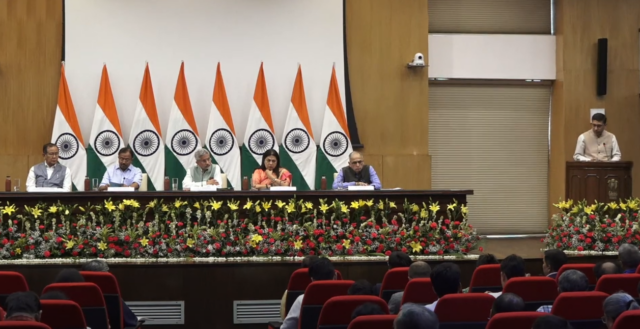NEW DELHI: Leveraging partnerships to facilitate growth is India’s biggest foreign policy challenge, says External Affairs Minister Dr S Jaishankar.
He was responding to a question from StratNewsGlobal, after a special briefing on how Indian foreign policy had evolved over nine years of the Narendra Modi government on Thursday, June 8.
“What does the rise of India mean, and how do we rise?” That was “the challenge which Prime Minister has posed to all of us – imagine Amrit Kaal next 25 years. What will you do to achieve your goals? And for us, in the field of foreign policy and national security, that has got its own issues. So, we are today trying to build the strengths, create the capabilities within the country,” he said.
“That’s why domestic changes are so important. Because if you don’t close the gender gap, eventually that means you will not get enough women into the workplace, which will impact not just your social growth, it will impact your economic growth as well. If you do not build infrastructure, you will not be competitive. If you do not invest in manufacturing, we will not have the deep strengths, we’ll be dependent on other countries.”
Other challenges included looking after the interests of the “one and a half to two crore Indians” who work abroad, and “about one and a half to two crore people of Indian origin who live abroad.” Then, “You have to look at challenges like technology and what it means for security…because today, your security can be breached without anybody crossing your border,” he added.
“So I would define foreign policy today is how do I set the right relationships, the optimal positioning, have the maximum number of friends, the least number of problems, and how do I accelerate national development so that in 25 years I’m well on my way to becoming a leading power…everything I told you which we have done for nine years, is actually aimed at exactly that.”
Earlier, he noted that “Among the many areas where India has seen significant transformation (over the past nine years of the Modi government), foreign policy would surely be one of them.”
This was “reflected in the country’s higher standing, greater influence, bigger footprint, new concepts and stronger delivery,” he emphasised.
While “there are many ways by which one can judge how foreign policy has changed, how it was delivered, where has it made its deepest impact, I would like to pick two broad themes today as the metrics by which you can evaluate Indian foreign policy over the last nine years,” he said. “The first theme is how does the world see India today. And the second is how foreign policy affected the lives of common citizens.”
Dr Jaishankar, who had returned a day earlier from Namibia where he gifted a Param supercomputer to the IT centre of a local university, listed several such initiatives that had transformed life in various countries. In Guyana, he handed over an India-built ferry, allowing connectivity among various islands in the region, and in Mozambique, India had supplied a train. “It wasn’t just a train, we actually made possible the beginnings of a suburban rail system in Maputo,” he said.
Other initiatives included the revival of a textile factory in Kenya, a metro express in Mauritius built by an Indian company from development funds granted by New Delhi, a cardamom seed centre in Laos, and entrepreneurship development centres in Djibouti and Rwanda.
To explain how big India’s development footprint is, he noted that it extended across 78 nations, and “we have done more than 600 major projects.”
“The second image of India today is of an economic collaborator…not just with the developing South but with the global economy. And you can see that in terms of the FDI flows, in terms of the increased exports, in terms of this very important conversation taking place in the world today about trusted collaboration,” he added. “And the third is really as a contributor, and there cannot be a better example of our contribution than Vaccine Maitri.”
Also, “…because we bring value there is a lot of interest today in partnering with India or getting India to join an organization. So, if you look at the last nine years, you had the Quad, you had the I2U2, you had our membership of the Shanghai Corporation Organization. You had a lot of migration mobility agreements. You had our entry into export control regimes because clearly our presence there adds additional value to their effectiveness,” he argued.
“We are also narrative shapers, and perhaps the most effective example of that the pressure that we have each time Raisina Dialogue is there. Today people want to listen to India, they want to be seen with India, they feel that working with us expands and sharpens their own influence as well,” he said.
“So, I think in all objectivity, the report card of Indian foreign policy of the last nine years under the Modi Government, is a very solid report card. It is a report card not just in terms of respect and outcomes, it is also a report card which tells every Indian citizen that they are more secure traveling abroad, that we have their back,” he underscored, adding, “It tells every citizen that foreign policy at the end of the day is purposed for their benefit, for their welfare, with their interests at heart. And that is really the report card that we would like to put before the nation today.”
Related links:
External links:
















